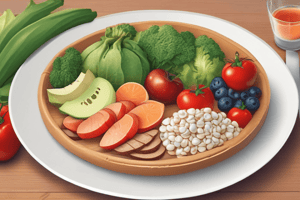Podcast
Questions and Answers
What is protein?
What is protein?
- A type of carbohydrate.
- A vitamin necessary for skin health.
- A kind of mineral.
- A class of energy-giving nutrients. (correct)
What is the study of food and how the body uses it known as?
What is the study of food and how the body uses it known as?
Nutrition
What do vitamins help maintain?
What do vitamins help maintain?
Health and growth
What class of nutrients includes sugars, starches, and fiber?
What class of nutrients includes sugars, starches, and fiber?
What is the state of not having enough of a nutrient called?
What is the state of not having enough of a nutrient called?
What is the recommended amount a person should consume in a day referred to as?
What is the recommended amount a person should consume in a day referred to as?
What class of nutrients serves as the main form of energy storage in the body?
What class of nutrients serves as the main form of energy storage in the body?
What are minerals needed for?
What are minerals needed for?
What are the recommended nutrient intakes for healthy people called?
What are the recommended nutrient intakes for healthy people called?
What do nutrients do for the body?
What do nutrients do for the body?
What is MyPyramid?
What is MyPyramid?
What are the Dietary Guidelines for Americans?
What are the Dietary Guidelines for Americans?
What does nutrient density measure?
What does nutrient density measure?
What is a vegetarian diet?
What is a vegetarian diet?
The six classes of nutrients are ____ , ____, ____, ____, ____, and _____
The six classes of nutrients are ____ , ____, ____, ____, ____, and _____
Name three vitamins and their functions: A: ____, E: ____, K: ____
Name three vitamins and their functions: A: ____, E: ____, K: ____
Name three minerals and their functions: Chromium- ____, Sulfur- ____, Iron- ____
Name three minerals and their functions: Chromium- ____, Sulfur- ____, Iron- ____
Why is drinking enough water important?
Why is drinking enough water important?
Why are certain foods called junk foods?
Why are certain foods called junk foods?
Flashcards are hidden until you start studying
Study Notes
Nutrients and Their Functions
- Protein: Essential for energy storage and building body tissues.
- Carbohydrates: Include sugars, starches, and fiber, serving as the primary energy source.
- Fat: Major energy source, also crucial for storing energy in the body.
- Vitamins: Organic compounds required in small amounts to support health and growth; crucial for various bodily functions.
- Minerals: Inorganic elements necessary for numerous physiological processes, including metabolism and bone health.
- Water: Vital for maintaining hydration, supporting bodily functions, and regulating temperature.
Health and Dietary Guidelines
- Nutrition: The study of food and how the body utilizes nutrients to function properly.
- Daily Value (DV): Recommended nutrient intake that guides dietary choices.
- Recommended Dietary Allowances (RDA): Standards for daily nutrient intake designed to meet the needs of almost all healthy individuals.
- Dietary Guidelines for Americans: A framework aimed at improving the dietary habits and overall health of the population.
Nutritional Concepts
- Nutrient Density: A measure comparing the nutritional value of foods to their caloric content; higher density indicates more nutrients per calorie.
- Nutrient Deficiency: Occurs when the body lacks sufficient nutrients, potentially leading to health issues.
- MyPyramid: A visual tool helping individuals understand food choices and portion sizes for a balanced diet.
Diet Types and Considerations
- Vegetarian Diet: Focuses on plant-based foods, often excluding meat and possibly other animal products.
- Junk Foods: High-calorie foods rich in fats, sugars, or salts but low in essential nutrients.
Water and Hydration
- Importance of adequate water intake to prevent dehydration, which negatively impacts both cognitive and physical performance.
Specific Nutrient Functions
-
Vitamins:
- Vitamin A: Maintains skin and eye health; essential for growth and bone health.
- Vitamin E: Protects cell membranes from oxidative damage.
- Vitamin K: Important for the blood clotting process.
-
Minerals:
- Chromium: Helps in blood sugar regulation.
- Sulfur: Necessary for protein metabolism.
- Iron: Essential for hemoglobin production in red blood cells.
Studying That Suits You
Use AI to generate personalized quizzes and flashcards to suit your learning preferences.




